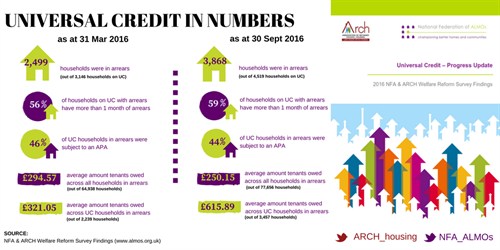Universal Credit was introduced as the central plank of a wide
ranging series of Welfare Reforms. This system was introduced by
the 2010 Coalition Government, to make work pay and to encourage
benefit claimants into full time work. Universal Credit combines
the following benefits and tax credits: Jobseeker's Allowance,
Employment and Support Allowance, Income Support, Child Tax Credit,
Working Tax Credit and Housing Benefit into one single monthly
payment. Universal Credit has been rolled out gradually but by May
2016 it had been rolled out nationally to all Jobcentre Plus
offices for single claimants, and is continuing to be expanded to
include all claimant types via the full service.
Since its introduction in April 2013 ARCH and the NFA (National
Federation of Almos) have been monitoring the impact of Universal
Credit on levels of rent arrears of households living in council
owned homes. Our latest analysis reports information as at 30
September 2016, and is the most recent report in the ongoing
research being undertaken jointly by ARCH and the NFA.
Further data will be captured from member local authorities and
ALMOs at the end of March 2017 and will be used to inform the
ongoing dialogue with government departments.
The latest research report published jointly on 16 January 2017
by ARCH and the NFA charts the impact of Universal Credit on the
rent arrears of households living in council owned homes. More than
two and a half years on since its introduction Universal
Credit continues to have a devastating impact on those households
and their ability to maintain rent payments and problems
experienced by Universal Credit claimants have not subsided but
have in fact dramatically worsened.
The following infographic highlights the main findings of our
report:

A snapshot of Universal Credit claimants at 30 September 2016
reveal:
- 86% of universal credit claimants living in council owned homes
are in rent arrears (compared to 79% at March 2016
- 59% of universal credit claimants living in council owned homes
have arrears that equate to more than one month's rent
- Although 63% of UC tenants in arrears had pre-existing arrears
before their UC claim only 44% of them are on APAs (alternative
payment arrangements with direct payment from DWP)
- The average value of arrears tenants owed across UC households
has almost doubled to £615 since 31 March 2016 when average amount
was £321.
The report highlights some major concerns for tenants and
council landlords which, unless addressed, will cause major
problems as Universal Credit is rolled out across the
country, John Bibby, ARCH CEO comments:
'We are extremely concerned with the upward trajectory of rent
arrears for universal credit households. Not only are numbers of
households increasing as UC is rolled out, but the percentage of
households falling into rent arrears and experiencing financial
difficulty is critically high. If this trend is not reversed it
will have significant impact on local authorities' rental income
streams and the long term ability for housing departments to
provide essential services to their communities. Together with the
NFA we continue to hold regular conversation with the DWP to find
ways to resolve the problems currently being experienced by
claimants.'
The Report and its findings has been submitted to the Department
of Works & Pensions and in ongoing talks with Caroline Nokes MP
(Department of Works & Pensions successor to Lord Freud
responsible for overseeing the implementation of Universal Credit)
ARCH and the NFA will continue to lobby for an end to the seven day
waiting period for Universal Credit claims.
Click here for a full copy of the
ARCH/NFA Report "Universal Credit - Progress Report" published on
16 January 2017
Publication of the Report has attracted significant media
interest and has featured in Inside Housing and other publications
including the Local Government Chronicle and 24Housing